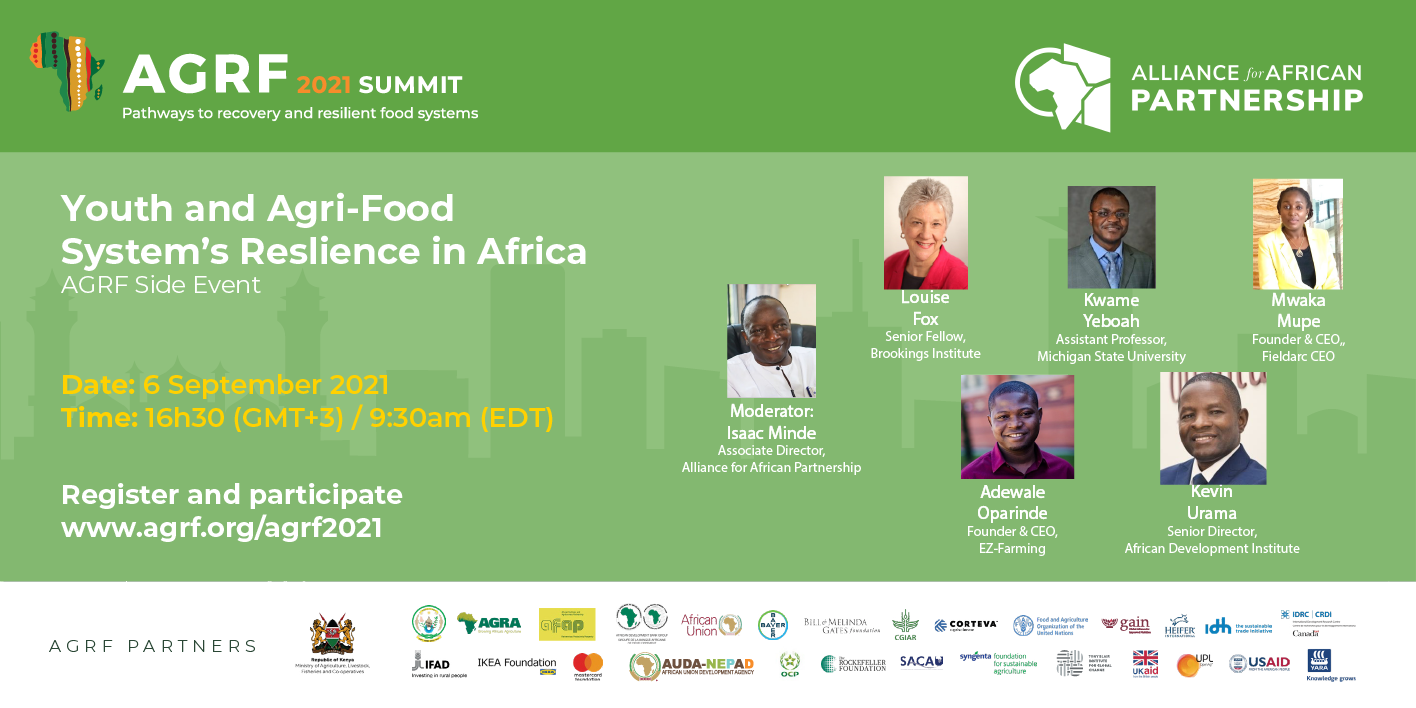Building a sustained and resilient agri-food system is an intergenerational mandate which demands the active engagement of African youth. With their large numbers, relatively high educational levels, and affinity for digital technology, African youth represent an indispensable resource, which if properly harnessed, can foster a more resilient and productive agri-food system. However, questions remain on effective strategies to harness youth innovativeness and energy. To help provide guidance for policy, this session discussed evidence-based and pragmatic approaches that could foster productive youth engagement supportive of resilient agri-food systems in Africa.

After kicking off with welcome remarks by Prof. Isaac Minde, the moderator, Dr. Louise Fox, Senior Fellow at the Brookings Institute, delivered a keynote message focusing on the differences in employment structures and opportunities between low/middle income countries and high-income countries and the kinds of interventions that could support African youth’s engagement in agri-food system. Fox highlighted that low- and middle-income countries tend to have a large number of self-employment opportunities, typically centered around farming. However, as a country’s income level rises, the number of opportunities in agriculture tends to fall. She noted that the most important interventions required to transform agri-food system and youth livelihoods such as land rights and markets, improving technology and infrastructure, and better credit and risk-management options, are structural challenges and not youth-specific. It is rather skill building that is youth specific. Hence, in addition to efforts addressing the structural challenges, she urged governments to focus youth interventions on building socio-emotional skills for youth, as well as creating networks and supporting social capital development, all while ensuring these interventions are scalable and inclusive of young women.
Following her remarks, Prof. Kevin Urama, Senior Director at the African Development Institute emphasized that “Africa’s greatest resource is its youth, which are the engine of its development”. He highlighted youth’s ability to think outside the box and innovate new approaches for agri-food systems as some of their strengths. Urama explained that establishing and sustainably financing youth transformation funds will allow for creativity and innovation to thrive, pointing out that African youth will not pursue agri-business unless they see it as a cutting-edge and well-invested field.
Following the two presentations, the panel took questions from the moderator and the audience, focusing specifically on strategies for youth engagement that have proven effective. Dr. Eric Ogunleye, an advisor to the Chief Economists at the African Development Bank stated “Youth should be engaged at every stage in the agri-business value chain, including in policy making”. He went on to say that empowering the youth, rather than just supporting them, has proven most effective.
Dr. Kwame Yeboah, Assistant Professor and Coordinator of the African Youth Transformation Platform at Michigan State University, outlined the individual and structural nature of the issues plaguing youth, including lack of experience, networks, financial resources, and skills, which cause young people to be disproportionately affected in times of economic crisis and shocks. He emphasized that empowering youth demands policies that recognize and upholds youth agency and expand their access to productive resources. Dr. Adewale Oparinde, CEO of EZ-Farming identified skills gap as the most pressing youth employment challenge. He shared some successes that his company has experienced to address the skill gap through a program that provide land to commercial farmers, who provide internships to young people. Ms. Mwaka Mupe, CEO of Fieldarc Global, highlighted that agri-food systems involve a number of different activities that can present opportunities for youth involvement. For example, food production never lacks a market, so strategic investments in specific sectors, like mushroom farming and aquaculture, can promote food security and nutrition while also addressing youth unemployment. Dr. Yeboah added that besides the direct provision of jobs, agricultural productivity growth is well-known to stimulate employment growth in the non-farm sectors because of its strong linkages with the rest of the economy. Hence, investments promoting broad-based agricultural productivity growth and resilience remains a critical component of an effective youth livelihood strategy.
A recording of the side-event can be found on the AAP YouTube channel.